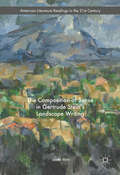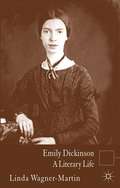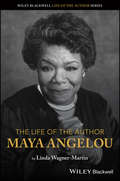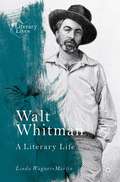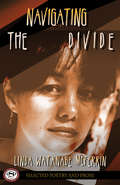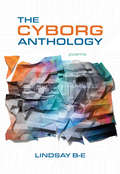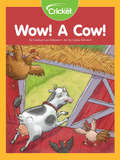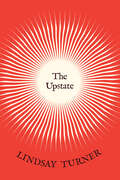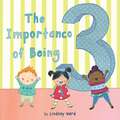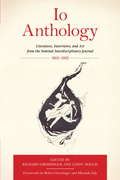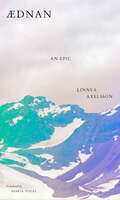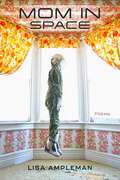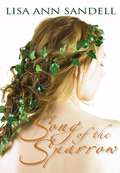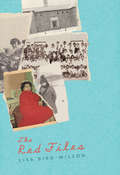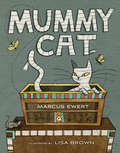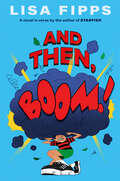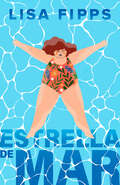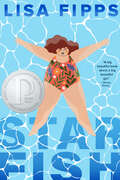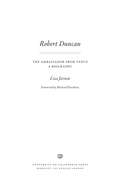- Table View
- List View
The Composition of Sense in Gertrude Stein's Landscape Writing (American Literature Readings in the 21st Century)
by Linda VorisThis book offers a bold critical method for reading Gertrude Stein’s work on its own terms by forgoing conventional explanation and adopting Stein’s radical approach to meaning and knowledge. Inspired by the immanence of landscape, both of Provence where she travelled in the 1920s and the spatial relations of landscape painting, Stein presents a new model of meaning whereby making sense is an activity distributed in a text and across successive texts. From love poetry, to plays and portraiture, Linda Voris offers close readings of Stein’s most anthologized and less known writing in a case study of a new method of interpretation. By practicing Stein’s innovative means of making sense, Voris reveals the excitement of her discoveries and the startling implications for knowledge, identity, and intimacy.
Emily Dickinson
by Linda Wagner-MartinNow published in paperback for the first time, this literary biography study offers a comprehensive account of Emily Dickinson's life, as a poet as well as a daughter of a prominent Amherst, Massachusetts, family. For many years accompanied by her large dog, she well knew the worlds of nature and natural beauties. For many more years, she chronicled her life - especially her life of the imagination - in hundreds of letters, as well as the nearly 1,800 poems that have been found. Such rich material informs this book's narrative, building a picture of a woman loyal to her parents and her myriad of friends, as well as siblings, niece and nephews, and her sister-in-law Susan Gilbert Dickinson, her constant muse. Never content with passive acceptance, or a life that conformed to the dutiful unmarried daughter's role, Dickinson the poet worked all her mature life to bring her art to its consistently firm - and always brilliant - greatness.
The Life of the Author: Maya Angelou (The Life of the Author)
by Linda Wagner-MartinTHE LIFE OF THE AUTHOR MAYA ANGELOU DISCOVER THE REMARKABLE LIFE OF MAYA ANGELOU WITH A HIGHLY PERSONAL AND DETAILED ACCOUNT OF HER CHALLENGES AND TRIUMPHS The Life of the Author: Maya Angelou delivers an engaging and thorough retelling of the life and work of the celebrated and accomplished writer, director, and essayist. The book offers readers an engrossing retelling of Maya Angelou’s entire life, from her time as a child in the segregated town of Stamps, Arkansas, to her death in 2014 in Winston-Salem. Written with an emphasis on accessibility, the author avoids critical theory and focuses on Maya Angelou’s growth as a person and writer as well as the ways in which her life influenced her work. This new biography tells the story of a young black woman who overcomes poverty and endemic structural and personal obstacles to lead an accomplished life. Readers will also enjoy: A thorough retelling of the time Maya Angelou spent in Africa and how it shaped her views and work An exploration of the screenplays written by Maya Angelou Discussions of Maya Angelou’s early life as a dancer, singer, and writer Accounts of Maya Angelou’s writing and production of television shows A fulsome treatment of Maya Angelou’s work, including her poems, autobiographies, films, music, and theatre Perfect for undergraduate students in Contemporary Literature courses as well as general readers who love Maya Angelou and her work, The Life of the Author: Maya Angelou will also earn a place in the libraries of biography and literature enthusiasts who seek to improve their understanding of the life and story of Maya Angelou with a highly personal and accessible new book.
Walt Whitman: A Literary Life (Literary Lives)
by Linda Wagner-MartinWalt Whitman: A Literary Life highlights two major influences on Whitman’s poetry and life: the American Civil War and his economic condition. Linda Wagner-Martin performs a close reading of many of Whitman’s poems, particularly his Civil War work (in Drum-Taps) and those poems written during the last twenty years of his life. Wagner-Martin’s study also emphasizes the near-poverty that Whitman experienced. Starting with his early career as a printer and journalist, the book moves to the publication of Leaves of Grass, and his cultivation of the persona of the “working-class” writer. In addition to establishing Whitman’s attention to the Civil War through journalism and memoirs, the book takes the approach of following Whitman’s life through his poems. Utilizing contemporary perspectives on class, Wagner-Martin provides a new reading of Whitman’s economic situation. This is an accessibly written synthesis of Whitman’s publication history bringing attention to under-studied aspects of his writing.
Navigating the Divide: Poetry & Prose (Legacy Series)
by Linda Watanabe McFerrinNavigating the Divide: Selected Poetry and Prose is a career-spanning, multi-genre collection from the award-winning Asian-American writer and indie lit legend Linda Watanabe McFerrin. In poetry and prose that is sometimes profoundly personal, sometimes astoundingly surreal, this world traveler and devoted literary explorer breaks down walls, bridges, cultures, and genres, delighting and instructing the reader. This rich, multi-faceted collection really does "navigate the divide" between spiritual and physical, between thought and desire, between identity and others.
The Cyborg Anthology
by Lindsay B-EPoems written by Cyborgs in the future – this collection melds sci-fi and poetry, human and machine. The Cyborg Anthology takes place in a future where there was a thriving world of Robots and Cyborgs living peacefully beside Humans, but a disaster destroyed all Robot and most Cyborg life. The book is organized like a typical anthology of literature, split into sections that include a biography of each poet and a sample of their poetry. It covers early Cyborg poetry, political, celebrity, and pop culture poets, and ends with the next generation of Cyborg poets. The narrative takes place in the time after a cataclysmic event, and the collection wrestles with this loss. Through the lives of the poets, the book chronicles the history of personhood for technological beings, their struggle for liberation, and demonstrates different ways a person can be Cyborg. The poems and biographies together tell the story of a complex and enthralling world-to-come, exploring topics that are important in the future, and also urgent right now. “With mordant wit and a playful satiric touch, these Cyborg poems showcase a dazzling range of poetic forms and ideas: imaginative and charmingly subversive. Move over Norton Anthology of Poetry, there’s a new force in town, and they are a delight.” —Renée Sarojini Saklikar, author of Listening to the Bees and Children of Air India "The premise of this collection alone is fabulous. The poems are potent and powerful. With echoes of Le Guin, Brunner and Monáe, Lindsay B-e’s debut is layered and smart, provocative, and deeply satisfying. I was moved and fascinated. Speculative poetry at its best." —Hiromi Goto, author of Chorus of Mushrooms and Darkest Light
Outdoor Farm, Indoor Farm
by Lindsay H. MetcalfDiscover how both outdoor and indoor farms sustainably grow the food we eat throughout the year in this vibrant, rhyming picture book.Outdoor farm, tractors toil.Indoor farm,zero soil.With energetic, enchanting verse and sunshiny, colorful illustrations, discover how the food you eat is grown both outside—and inside! Join two children as they explore the inner workings of an outdoor farm and an indoor farm. You&’ll see how a variety of amazing machinery like tractors and drones along with innovative farming techniques yield the wonderful food we all love to enjoy.
Wow! A Cow!
by Lindsay Lee JohnsonSomeone leaves the barn door open and there's chaos. Find out how Blue the dog comes to the rescue.
When You Die You Will Not Be Scared to Die
by Lindsay TunklThis brief artistic collection of fears around dying--and their ultimate futility in the face of the unknown--is a keepsake, a prayer book, a prompt for contemplation, and a gift to give to others to inspire conversations about the liberating power of death and what makes a good life.This small book of 12 meditations on death is intentionally repetitive and hypnotic in effect, and will inspire the reader to list what scares them most, come to terms with their own mortality, and realize what fears are holding them back from living a life fully with 100 percent commitment. It will appeal to anyone who wishes to live with greater intention and purpose and experience more joy and appreciation of the present moment. Buddhists and mindfulness practitioners, people who are aging, people who read the news and are worried, artists, people who are taking care of others who are dying, people who are dying (i.e., all of us ...), Tarot card readers and modern-day shamans will all find inspiration in these terse lists. Young people aghast at the adult world's seeming indifference to our mortality will especially relate to the uncompromising vision of this book.
The Upstate (Phoenix Poets)
by Lindsay TurnerPoetry that sings of southern Appalachian beauty and crisis. Set in a landscape of red sunsets and wildfire smoke, Queen Anne’s lace on the roadsides, and toxic chemicals in the watershed, Lindsay Turner’s The Upstate is a book about southern Appalachia in a contemporary moment of change and development. Layering a personal lyric voice with a broader awareness of labor issues and political and ecological crises, The Upstate redefines a regional poetics as one attuned to national and global systems. These poems observe and emote, mourning acts of devastation and raging in their own quiet way against their continuation. The poems in The Upstate arise from moments of darkness and desperation, mobilizing a critical intelligence against the status quo of place and history, all while fiercely upholding belief in the role of poetry to affect these conditions. Turner’s poems weave spells around beloved places and people, yearning to shield them from destruction and to profess faith in the delicate beauties of the world at hand.
The Importance of Being 3
by Lindsay WardThe perfect present for three-year-olds, this picture book is a celebration of all things three! All the best things come in threes, not one, not two, but three, like the three-year-olds in this sweet picture book. As all parents know, three is a big year. Follow along as three friends learn new things in threes—from tricycles to triangles—take a dip in the pool, and play in the park with their friends! Of course, it&’s not all fun and games. There&’s a tantrum and then hugs all around as the three kids head to bed. This adorable picture book celebrating important life events is the perfect gift for third birthdays. Kids will love pointing out all the activities they can do now that they are three years old.
Juvenal
by Lindsay Watson Patricia WatsonJuvenal's sixth Satire is a masterpiece of comic hyperbole, an outrageous rant against women and marriage which, in its breadth and density, represents the high point of the misogynistic literature of classical antiquity. The Introduction situates Juvenal within the wider tradition of Roman satire, interrogates afresh the poem's architecture and recurrent themes, shows how Juvenal systematically attributes to his monstrous women the inverse of the Roman wife's canonical virtues, traces the various literary currents which infuse the Satire, and lastly addresses the much-discussed issue of the poetic voice or persona from a sociohistorical as well as a theoretical perspective. Above all, the commentary strives to locate Juvenal in his historical, literary and cultural context, while simultaneously affording assistance with the nuts and bolts of the Latin, and always keeping in view two key questions: what was Juvenal's purpose in writing the Satire? How seriously was it meant to be taken?
Io Anthology
by Miranda July Richard Grossinger Lindy Hough Robin GrossingerIo Anthology celebrates the fiftieth anniversary of this formative journal and commemorates its role in opening a path to decades of innovative publishing.Bringing together in one volume the quirky blend of artistic and scholarly writing that characterized the literary journal, this book is a "greatest hits" collection of the major pieces published from 1965 to 1993. It features very early work from Stephen King, Gary Snyder, Jayne Anne Phillips, and many others, with forewords by writer and filmmaker Miranda July and historical ecologist Robin Grossinger, the daughter and son of the editors, who grew up with Io and were in part initiated in their careers by its household presence. Io forged an eclectic path through the upheaveals of the 1960s in art, literature, science, and the life of the spirit with writing that embraced astrophysics, science fiction, parapsychology, topology, poetry from Black Mountain, Beat, and New American traditions, wisdom from Hopi and Iglulik elders, homeopathy, hermetics, alchemy and the occult, astrology, Tibetan Buddhism, and Sufism. Portraying the roots and spirit which impelled Io to evolve into a publishing company, this volume shows the seriousness and depth of content which continues to enliven North Atlantic Books.From the Trade Paperback edition.ng the continuity of purpose and content between North Atlantic Books, which grew out of the magazine, this volume chronicles the voices and spirit that continue to enliven the publishing vision that persists to this day.
Aednan: An Epic
by Linnea AxelssonThe winner of Sweden&’s most prestigious literary award makes her American debut with an epic, multigenerational novel-in-verse about two Sámi families and their quest to stay together across a century of migration, violence, and colonial trauma.In Northern Sámi, the word Ædnan means the land, the earth, and my mother. These are all crucial forces within the lives of the Indigenous families that animate this groundbreaking book: an astonishing verse novel that chronicles a hundred years of change: a book that will one day stand alongside Halldór Laxness&’s Independent People and Sigrid Undset&’s Kristin Lavransdatter as an essential Scandinavian epic.The tale begins in the 1910s, as Ristin and her family migrate their herd of reindeer to summer grounds. Along the way, forced to separate due to the newly formed border between Sweden and Norway, Ristin loses one of her sons in the aftermath of an accident, a grief that will ripple across the rest of the book. In the wake of this tragedy, Ristin struggles to manage what&’s left of her family and her community.In the 1970s, Lise, as part of a new generation of Sámi grappling with questions of identity and inheritance, reflects on her traumatic childhood, when she was forced to leave her parents and was placed in a Nomad School to be stripped of the language of her ancestors. Finally, in the 2010s we meet Lise&’s daughter, Sandra, an embodiment of Indigenous resilience, an activist fighting for reparations in a highly publicized land rights trial, in a time when the Sámi language is all but lost.Weaving together the voices of half a dozen characters, from elders to young people unsure of their heritage, Axelsson has created a moving family saga around the consequences of colonial settlement. Ædnan is a powerful reminder of how durable language can be, even when it is borrowed, especially when it has to hold what no longer remains. &“I was the weight / in the stone you brought / back from the coast // to place on / my grave,&” one character says to another from beyond the grave. &“And I flew above / the boat calling / to you all: // There will be rain / there will be rain.&”
Found Life: Poems, Stories, Comics, a Play, and an Interview (Russian Library)
by Linor GoralikOne of the first Russian writers to make a name for herself on the Internet, Linor Goralik writes conversational short works that conjure the absurd in all its forms, reflecting post-Soviet life and daily universals. Her mastery of the minimal, including a wide range of experiments in different forms of micro-prose, is on full display in this collection of poems, stories, comics, a play, and an interview, here translated for the first time. In Found Life, speech, condensed to the extreme, captures a vivid picture of fleeting interactions in a quickly moving world. Goralik's works evoke an unconventional palette of moods and atmospheres—slight doubt, subtle sadness, vague unease—through accumulation of unexpected details and command over colloquial language. While calling up a range of voices, her works are marked by a distinct voice, simultaneously slightly naïve and deeply ironic. She is a keen observer of the female condition, recounting gendered tribulations with awareness and amusement. From spiritual rabbits and biblical zoos to poems about loss and comics about poetry, Goralik's colorful language and pervasive dark comedy capture the heights of ridiculousness and the depths of grief.
The World Is Awake: A Celebration of Everyday Blessings
by Linsey DavisInspire children to be thankful for all of God&’s blessings with this joyful celebration of the simple pleasures all around us. Perfect for sharing at bedtime or story time, The World Is Awake gives children (and their parents) a sense of awe and wonder at the world around them.Linsey Davis, New York Times bestselling author and Emmy Award-winning ABC News anchor, invites us to celebrate the everyday miracles that surround us in this inspiring and diverse picture book. From blooming flowers in the backyard to the roaring animals at the zoo to the breeze in the evening trees … the world is awake!Now also available as a board book, The World Is Awake:features playful and heartwarming read-aloud rhymes from Emmy Award-winning ABC News anchor Linsey Davisincludes whimsical, joy-filled illustrations from bestselling artist Lucy Flemingis a great board book for ages 0-4, preschool, kindergarten and early elementary age kidscelebrates diversity and inspires gratitude for God&’s blessingsmakes a wonderful gift for birthdays, Easter, and other gift-giving holidaysCelebrate your everyday blessings through The World Is Awake.Look for additional inspirational children&’s picture books and audio products from award-winning author Linsey Davis:Smallest Spot of a DotHow High is HeavenStay This Way ForeverOne Big HeartThe Linsey Davis Children&’s Audio Collection
Mom in Space: Poems
by Lisa AmplemanMom in Space is a complicated love letter to both the intergalactic and the terrestrial. Using the lens of spaceflight, Lisa Ampleman explores subjects ranging from the personal to the political, from fertility tests and parenting to climate change and civil rights.As NASA and commercial space companies gear up for Artemis missions to the moon, Mom in Space offers new conceptions of women in space, incorporating both fictional and real female astronauts, among them the first mom in space (Anna Fisher) and the first Black woman in space (Mae Jemison). With a sense of both awe and informed inquiry, Mom in Space considers what spaceflight means not just for those who get rocketed into space but for those who stay home.
Song of the Sparrow
by Lisa Ann SandellSince she was a small child, Elaine has been the only woman living in a military camp with hundreds of men. When her mother died, her father took Elaine and her brothers to Arthur's camp, where she regularly mingles with people who are now legends.
The Red Files
by Lisa Bird-WilsonThis debut poetry collection from Lisa Bird-Wilson reflects on the legacy of the residential school system: the fragmentation of families and histories, with blows that resonate through the generations.Inspired by family and archival sources, Bird-Wilson assembles scraps of a history torn apart by colonial violence. The collection takes its name from the federal government's complex organizational structure of residential schools archives, which are divided into "black files" and "red files." In vignettes as clear as glass beads, her poems offer affection to generations of children whose presence within the historic record is ghostlike, anonymous and ephemeral.The collection also explores the larger political context driving the mechanisms that tore apart families and cultures, including the Sixties Scoop. It depicts moments of resistance, both personal and political, as well as official attempts at reconciliation: "I can hold in the palm of my right hand / all that I have left: one story-gift from an uncle, / a father's surname, treaty card, Cree accent echo, metal bits, grit- / and I will still have room to cock a fist."The Red Files concludes with a fierce hopefulness, embracing the various types of love that can begin to heal the traumas inflicted by a legacy of violence.
Mummy Cat
by Lisa Brown Marcus EwertDeep within this maze of stone, a creature wakes up, all alone . . . Mummy Cat prowls his pyramid home, longing for his beloved owner. As he roams the tomb, lavish murals above his head display scenes of the cat with his young Egyptian queen, creating a story-within-a-story about the events of centuries past. Hidden hieroglyphs deepen the tale and are explained in an informative author's note. Marcus Ewert and Lisa Brown's smart, beautiful book is a marvel of sophisticated simplicity, infinitely engaging to examine in detail, and complete with a sweetly surprising plot twist sure to delight young cat-lovers and budding Egyptologists alike.
Does Your Mama Know?: An Anthology of Black Lesbian Coming Out Stories
by Lisa C. Mooreshort stories
And Then, Boom!
by Lisa FippsA gripping new novel in verse by the author of the Printz Honor-winning Starfish, featuring a poverty-stricken boy who bravely rides out all the storms life keeps throwing at himJoe Oak is used to living on unsteady ground. His mom can&’t be depended on as she never stays around long once she gets &“the itch,&” and now he and his beloved grandmother find themselves without a home. Fortunately, Joe has an outlet in his journals and drawings and takes comfort from the lessons of comic books—superheroes have a lot of &“and then, boom&” moments, where everything threatens to go bust but somehow they land on their feet. And that seems to happen a lot to Joe too, as in this crisis his friend Nick helps them find a home in his trailer park. But things fall apart again when Joe is suddenly left to fend for himself. He doesn&’t tell anyone he&’s on his own, as he fears foster care and has hope his mom will come back. But time is running out—bills are piling up, the electricity&’s been shut off, and the school year&’s about to end, meaning no more free meals. The struggle to feed himself gets intense, and Joe finds himself dumpster diving for meals. He&’s never felt so alone—until an emaciated little dog and her two tiny pups cross his path. And fate has even more in store for Joe, because an actual tornado is about to hit home—and just when it seems all is lost, his life turns in a direction that he never could have predicted.
Estrella de mar / Starfish
by Lisa Fipps¡Seleccionado como Honor Book por el Premio Printz! Ellie está cansada de que la avergüencen por su peso y decide cambiar eso en esta conmovedora novela en verso, la primera de Lisa Flipps. Desde que Ellie usó un traje de baño de ballena y causó gran revuelo en su fiesta de cumpleaños número 5, ha sido acosada por su peso. Para sobrellevar la situación, trata de vivir según las Reglas de las Chicas Gordas, como “no hacer olas”, “evitar comer en público” y “no moverse tan rápido para que su cuerpo no se mueva”. Ha encontrado su espacio seguro, su piscina, donde se siente ingrávida en un mundo obsesionado con las grasas. En el agua, puede estirarse como una estrella de mar y ocupar todo el espacio que quiera. También es donde puede alejarse de su madre, quien piensa que criticar con insistencia el peso de Ellie la motivará a hacer dieta. Pero Ellie tiene aliados como su padre, su terapeuta y su nueva vecina, Catalina, que ama a Ellie por quien es. Con este apoyo, Ellie finalmente podrá dejar de lado las Reglas de las Chicas Gordas y las estrellas de mar en la vida real, sin disculparse por ser ella misma ni por ser fabulosa.
Starfish
by Lisa FippsEllie is tired of being fat-shamed and does something about it in this poignant debut novel-in-verse. <P><P>Ever since Ellie wore a whale swimsuit and made a big splash at her fifth birthday party, she's been bullied about her weight. To cope, she tries to live by the Fat Girl Rules--like "no making waves," "avoid eating in public," and "don't move so fast that your body jiggles." And she's found her safe space--her swimming pool--where she feels weightless in a fat-obsessed world. In the water, she can stretch herself out like a starfish and take up all the room she wants. <P><P>It's also where she can get away from her pushy mom, who thinks criticizing Ellie's weight will motivate her to diet. Fortunately, Ellie has allies in her dad, her therapist, and her new neighbor, Catalina, who loves Ellie for who she is. With this support buoying her, Ellie might finally be able to cast aside the Fat Girl Rules and starfish in real life--by unapologetically being her own fabulous self.
Robert Duncan, The Ambassador from Venus: A Biography
by Michael Davidson Lisa JarnotThis definitive biography gives a brilliant account of the life and art of Robert Duncan (1919-1988), one of America's great postwar poets. Lisa Jarnot takes us from Duncan's birth in Oakland, California, through his childhood in an eccentrically Theosophist household, to his life in San Francisco as an openly gay man who became an inspirational figure for the many poets and painters who gathered around him. Weaving together quotations from Duncan's notebooks and interviews with those who knew him, Jarnot vividly describes his life on the West Coast and in New York City and his encounters with luminaries such as Henry Miller, Anaïs Nin, Tennessee Williams, James Baldwin, Paul Goodman, Michael McClure, H.D., William Carlos Williams, Denise Levertov, Robert Creeley, and Charles Olson.
